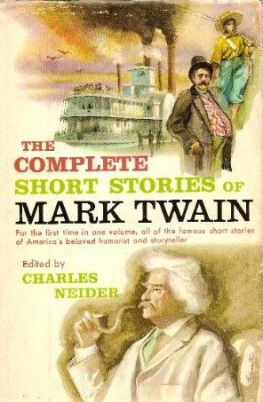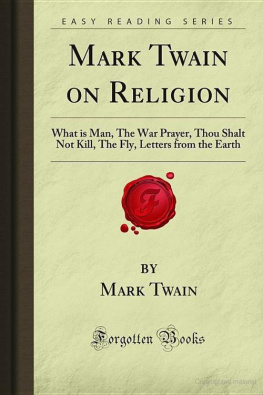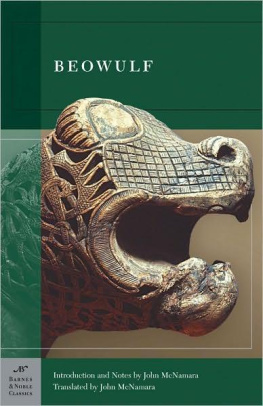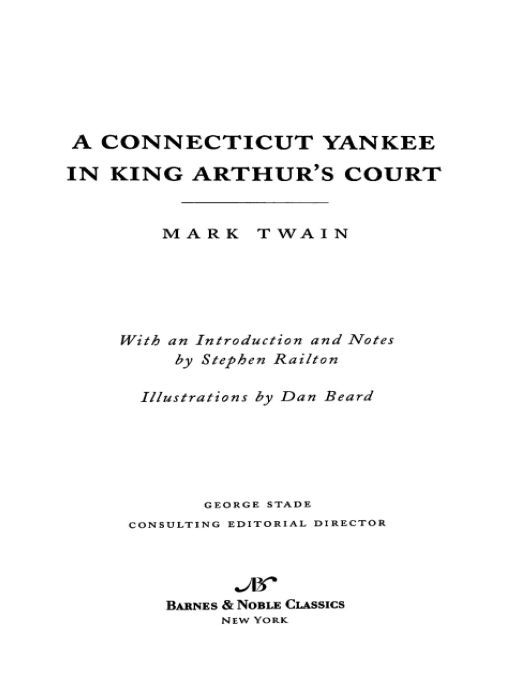
Table of Contents
FROM THE PAGES OF A CONNECTICUT YANKEE IN KING ARTHURS COURT
I shall never see my friends againnever, never again. They will not be born for more than thirteen hundred years yet.
Merlin has wrought a spell! Merlin, forsooth! That cheap old humbug, that maundering old ass? Bosh, pure bosh, the silliest bosh in the world! Why, it does seem to me that of all the childish, idiotic, chuckle-headed, chicken-livered superstitions that evoh, damn Merlin!
To return to my anomalous position in King Arthurs kingdom. Here I was, a giant among pigmies, a man among children, a master intelligence among intellectual moles: by all rational measurement the one and only actually great man in that whole British world; and yet there and then, just as in the remote England of my birth-time, the sheep-witted earl who could claim long descent from a kings leman, acquired at second-hand from the slums of London, was a better man than I was.
There never was such a country for wandering liars; and they were of both sexes.
Concentration of power in a political machine is bad; and an Established Church is only a political machine; it was invented for that; it is nursed, cradled, preserved for that; it is an enemy to human liberty.
There is no accounting for human beings.
Intellectual work is misnamed; it is a pleasure, a dissipation, and is its own highest reward. The poorest paid architect, engineer, general, author, sculptor, painter, lecturer, advocate, legislator, actor, preacher, singer, is constructively in heaven when he is at work.
There is that about earthly pomps which doth ever move to reverence.
The law is clear: it doth not require the claimant to prove ye are slaves, it requireth you to prove ye are not.
Dreams that were as real as realitydelirium, of course, but so real!
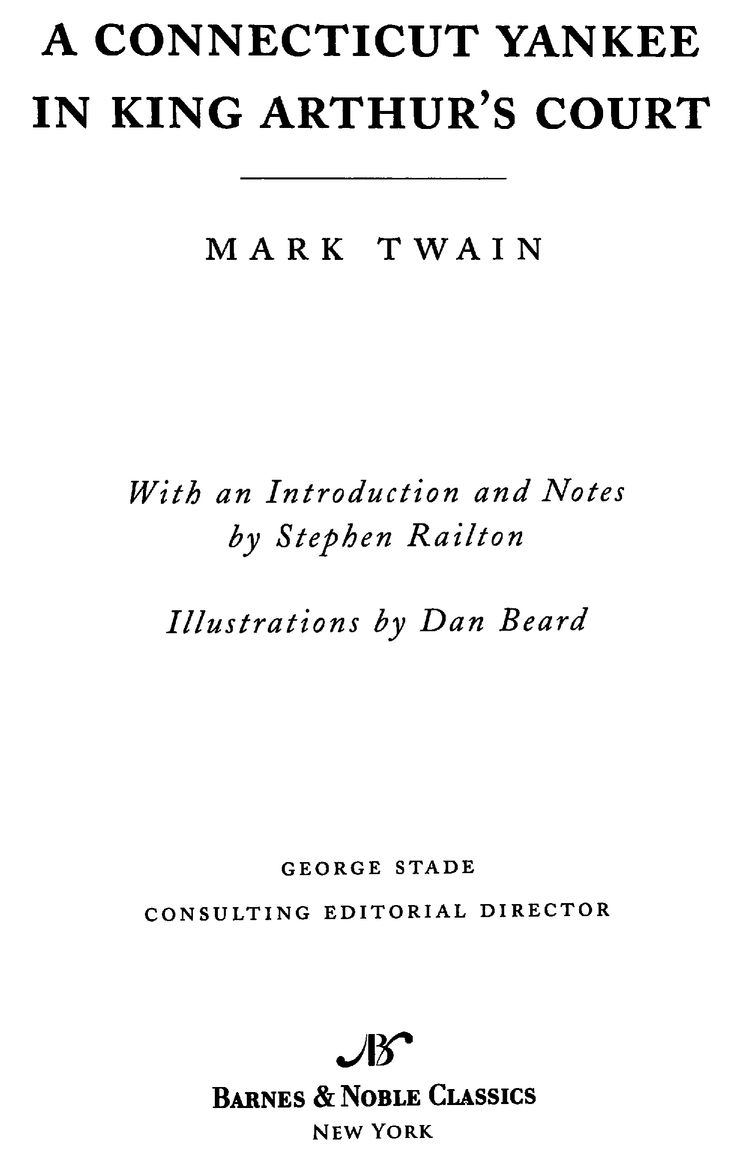
MARK TWAIN
Mark Twain was born Samuel Langhorne Clemens on November 30, 1835. When Sam was four years old, his family moved to Hannibal, Missouri, a small town later immortalized in The Adventures of Tom Sawyer and Adventures of Huckleberry Finn. After the death of his father, twelve-year-old Sam quit school and supported his family by working as a delivery boy, a grocers clerk, and an assistant blacksmith until he was thirteen, when he became an apprentice printer. He worked for several newspapers, traveled throughout the country, and established himself as a gifted writer of humorous sketches. Abandoning journalism at points to work as a riverboat pilot, Clemens adventured up and down the Mississippi, learning the 1,200 miles of the river.
During the 1860s he spent time in the West, in newspaper work and panning for gold, and traveled to Europe and the Holy Land; The Innocents Abroad (1869) and Roughing It (1872) are accounts of those experiences. In 1863 Samuel Clemens adopted a pen name, signing a sketch as Mark Twain, and in 1867 Mark Twain won fame with the publication of a collection of humorous writings, The Celebrated Jumping Frog of Calaveras County and Other Sketches. After marrying and settling in Connecticut, Twain wrote his best-loved works: the novels about Tom Sawyer and Huckleberry Finn, and the nonfiction work Life on the Mississippi. Meanwhile, he continued to travel and had a successful career as a public lecturer.
In his later years, Twain saw the world with increasing pessimism following the death of his wife and two of their three daughters. The tone of his later novels, including The Tragedy of Puddnhead Wilson and A Connecticut Yankee in King Arthurs Court, became cynical and dark. Having failed as a publisher and suffering losses from ill-advised investments, Twain was forced by financial necessity to maintain a heavy schedule of lecturing. Though he had left school at an early age, his genius was recognized by Yale University, the University of Missouri, and Oxford University in the form of honorary doctorate degrees. He died in his Connecticut mansion, Stormfield, on April 21, 1910.
THE WORLD OF MARK TWAIN ANDA CONNECTICUT YANKEE IN KING ARTHURS COURT
| 1835 | Samuel Langhorne Clemens is born prematurely in Florida, Missouri, the fourth child of John Marshall Clemens and Jane Lampton Clemens. |
| 1839 | The family moves to Hannibal, the small Missouri town on the west bank of the Mississippi River that will become the model for the setting of Tom Sawyer and Huckleberry Finn. |
| 1840 | American newspapers gain increased readership as urban populations swell and printing technology improves. |
| 1847 | John Clemens dies, leaving the family in financial difficulty. Sam quits school at the age of twelve. |
| 1848 | Sam becomes a full-time apprentice to Joseph Ament of the Missouri Courier. |
| 1850 | Sams brother Orion, ten years his senior, returns to Hannibal and establishes the Journal; he hires Sam as a compositor. Steamboats become the primary means of transport on the Mississippi River. |
| 1852 | Sam edits the failing Journal while Orion is away. After he reads local humor published in newspapers in New England and the Southwest, Sam begins printing his own humorous sketches in the journal. He submits The Dandy Frightening the Squatter to the Carpet-Bag of Boston, which publishes the sketch in the May issue. |
| 1853 | Sam leaves Hannibal and begins working as an itinerant printer; he visits St. Louis, New York, and Philadelphia. His brothers Orion and Henry move to Iowa with their mother. |
| 1854 | Transcendentalism flourishes in American literary culture; Henry David Thoreau publishes Walden. |
| 1855 | Sam works again as a printer with Orion in Keokuk, Iowa. |
| 1856 | Sam acquires a commission from Keokuks Daily Post to write humorous letters; he decides to travel to South America. |
| 1857 | Sam takes a steamer to New Orleans, where he hopes to find a ship bound for South America. Instead, he signs on as an apprentice to river pilot Horace Bixby and spends the next two years learning how to navigate a steamship up and down the Mississippi. His experiences become material for Life on the Mississippi and his tales of Tom Sawyer and Huck Finn. |
| 1858 | Sams brother Henry dies in a steamboat accident. |
| 1859 | Samuel Clemens becomes a fully licensed river pilot. |
| 1861 | The American Civil War erupts, putting an abrupt stop to river trade between North and South. Sam serves with a Confederate militia for two weeks before venturing to the Nevada Territory with Orion, who had been appointed by President Abraham Lincoln as secretary of the new Territory. |
| 1862 | After an unsuccessful stint as a miner and prospector for gold and silver, Clemens begins reporting for the Territorial Enterprise in Virginia City, Nevada. |
| 1863 | Clemens signs his name as Mark Twain on a humorous travel sketch printed in the Territorial Enterprise. The pseudonym, a riverboat term meaning two fathoms deep, connotes barely navigable water. |
| 1864 | After challenging his editor to a duel, Twain is forced to leave Nevada and lands a job with a San Francisco newspaper. He meets Artemus Ward, a popular humorist, whose techniques greatly influence Twains writing. |


